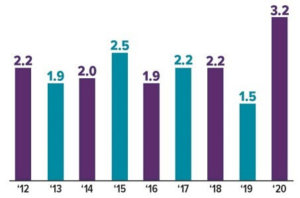According to a March 2021 survey, an estimated 2.8 million Americans ages 55 and older decided to file for Social Security benefits earlier than they expected because of COVID-19. This was about double the 1.4 million people in the same age group who said they expected to work longer, presumably due to pandemic-related financial losses.1
Many older workers were pushed into retirement after losing their jobs, and others may have had health concerns. Still, it appears that work-related stress and the emotional toll of the pandemic caused a lot of people to rethink their priorities and their retirement timelines.
Annual increase in the number of retired baby boomers (in millions)

Source: Pew Research Center, 2020
How do you know if you can realistically afford to retire early? First and foremost, determine whether you will have enough income to support the lifestyle you envision. Instead of accumulating assets, you may have to start draining your life savings to cover living expenses. Here are four important factors to consider.
Lost Income and Savings
You may be sacrificing years of future earnings and contributions to your retirement accounts. For example, an early retiree who was making $80,000 per year would forgo about $400,000 of salary over five years or $800,000 over a decade, not counting cost-of-living or merit increases. The 10-year total rises to nearly $1 million when annual raises averaging just 3% are included.
If the same retiree could have contributed 5% of salary to an employer-sponsored retirement plan with a 100% match, he or she would also miss out on $8,000 in contributions in the first year, more than $40,000 over five years, and almost $100,000 over 10 years.
Debt and Other Financial Responsibilities
If you are still paying a mortgage, have other debts, or are supporting children or aging parents, you may not be ready to retire. Ideally, you should be free of “extra” financial responsibilities so you can focus on meeting your own living expenses without a regular paycheck.
Reduced Social Security Benefits
The earliest age you can file for Social Security is 62, but your benefit would be reduced to 70% or 75% of your full retirement benefit — for the rest of your life. So even if you do decide to retire, you might think about waiting to claim your benefit until you reach full retirement age (age 66 to 67, depending on the year you were born) or longer if you have enough income and/or savings to cover your expenses. For every year you wait past your full retirement age, your benefits will increase by 8% (up to age 70).
Higher Medical Costs
If you retire before you (or a spouse) become eligible for Medicare at age 65, you could lose access to an affordable employer-provided health plan. You can purchase health insurance through the Health Insurance Marketplace or a broker, but the age-based premiums are more expensive for older applicants. For two 60-year-olds with a household income of $100,000, the average premium for a silver Marketplace plan in 2021 is $708 per month ($8,500 per year), after subsidies. And if you seek medical treatment, you’ll typically need to cover copays, deductibles, coinsurance, and some other expenses (up to the plan’s out-of-pocket maximum).2
Even with Medicare, it’s estimated that a married couple who retired at age 65 in 2020, with median prescription drug expenses, would need $270,000 to have a 90% chance of paying their health-care costs throughout retirement.3
The bottom line is that some people might be giving up more than they realize when they retire early. Before you say goodbye to the working world, be sure you have the resources to carry you through the next phase of your life.
1) U.S. Census Bureau, 2021
2) Kaiser Family Foundation, 2021
3) Employee Benefit Research Institute, 2020
Copyright 2006- Broadridge Investor Communication Solutions, Inc. All rights reserved.
Broadridge Investor Communication Solutions, Inc. does not provide investment, tax, or legal advice. The information presented here is not specific to any individual’s personal circumstances.
To the extent that this material concerns tax matters, it is not intended or written to be used, and cannot be used, by a taxpayer for the purpose of avoiding penalties that may be imposed by law. Each taxpayer should seek independent advice from a tax professional based on his or her individual circumstances.
These materials are provided for general information and educational purposes based upon publicly available information from sources believed to be reliable—we cannot assure the accuracy or completeness of these materials. The information in these materials may change at any time and without notice.
*Non-deposit investment products and services are offered through CUSO Financial Services, L.P. (“CFS”), a registered broker-dealer (Member FINRA / SIPC) and SEC Registered Investment Advisor. Products offered through CFS: are not NCUA/NCUSIF or otherwise federally insured, are not guarantees or obligations of the credit union, and may involve investment risk including possible loss of principal. Investment Representatives are registered through CFS. Coastal Federal Credit Union has contracted with CFS to make non-deposit investment products and services available to credit union members.
CFS representatives do not provide tax or legal guidance. For such guidance please consult with a qualified professional. Information shown is for general illustration purposes and does not predict or depict the performance of any investment or strategy. Past performance does not guarantee future results.
Trust Services are available through MEMBERS Trust Company. CFS* is not affiliated with Members Trust Company.






